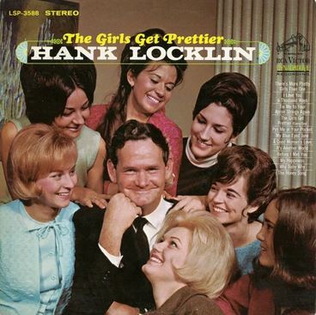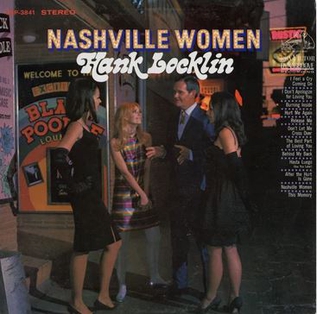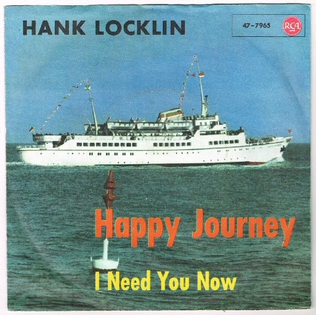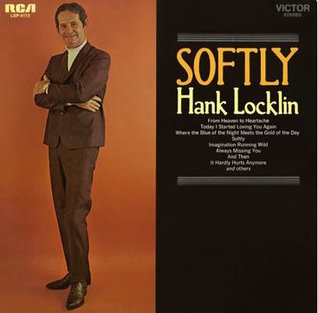
Chester Burton Atkins, known as "Mr. Guitar" and "The Country Gentleman", was an American musician who, along with Owen Bradley and Bob Ferguson, helped create the Nashville sound, the country music style which expanded its appeal to adult pop music fans. He was primarily a guitarist, but he also played the mandolin, fiddle, banjo, and ukulele, and occasionally sang.

"Your Cheatin' Heart" is a song written and recorded by country music singer-songwriter Hank Williams in 1952. It is regarded as one of country's most important standards. Williams was inspired to write the song while driving with his fiancée from Nashville, Tennessee, to Shreveport, Louisiana. After describing his first wife Audrey Sheppard as a "Cheatin' Heart", he dictated in minutes the lyrics to Billie Jean Jones. Produced by Fred Rose, Williams recorded the song on his last session at Castle Studio in Nashville, Tennessee, on September 23.
"Jambalaya " is a song written and recorded by American country music singer Hank Williams that was first released in July 1952. It is Williams' most covered song. Named for a Creole and Cajun dish, jambalaya, it spawned numerous cover versions and has since achieved popularity in several different music genres.
"Cold, Cold Heart" is a country music and pop song written and first recorded by Hank Williams. This blues ballad is both a classic of honky-tonk and an entry in the Great American Songbook.
This is a list of notable events in country music that took place in the year 1954.
"I'm So Lonesome I Could Cry" is a song written and recorded by American country music singer-songwriter Hank Williams in 1949. The song has been covered by a wide range of musicians.

"The Battle of New Orleans" is a song written by Jimmy Driftwood. The song describes the Battle of New Orleans from the perspective of an American soldier; the song tells the tale of the battle with a light tone and provides a rather comical version of what actually happened at the battle. It has been recorded by many artists, but the singer most often associated with this song is Johnny Horton. His version scored number 1 on the Billboard Hot 100 in 1959. Billboard ranked it as the No. 1 song for 1959, it was very popular with teenagers in the late 1950s/early 1960s in an era mostly dominated by rock and roll music.

"Kaw-Liga" is a country music song written by Hank Williams and Fred Rose.
"Long Gone Lonesome Blues" is a 1950 song by Hank Williams. It was Williams' second number-one single on the Country & Western chart. "Long Gone Lonesome Blues" stayed on the charts for 21 weeks, with five weeks at the top.
"Take These Chains from My Heart" is a song by Hank Williams. It was written by Fred Rose and Hy Heath and was recorded at Williams' final recording session on September 23, 1952, in Nashville. The song has been widely praised; Williams' biographer Colin Escott deems it "perhaps the best song [Rose] ever presented to Hank...It was one of the very few songs that sounded somewhat similar to a Hank Williams song." Williams is backed by Tommy Jackson (fiddle), Don Helms, Chet Atkins, Jack Shook, and Floyd "Lightnin'" Chance (bass). In the wake of Williams' death on New Year's Day, 1953, the song shot to No. 1, his final chart-topping hit for MGM Records. Like "Your Cheatin' Heart," the song's theme of despair, so vividly articulated by Williams' typically impassioned singing, reinforced the image of Hank as a tortured, mythic figure.
"You Win Again" is a 1952 song by Hank Williams. In style, the song is a blues ballad and deals with the singer's despair with his partner. The song has been widely covered, including versions by Ray Charles, Jerry Lee Lewis, Roy Orbison, the Grateful Dead, Charley Pride, Bob Dylan, and the Rolling Stones.
"Dear John" is a song written by Tex Ritter and Aubrey Gass. It is best remembered for being the A-side to Hank Williams' number one hit "Cold, Cold Heart" in 1951 for MGM Records.

Happy Journey is a studio album by American country singer–songwriter Hank Locklin. It was released in January 1962 via RCA Victor Records and was produced by Chet Atkins. Happy Journey was Locklin's third studio album released in his recording career. It contained a total of 12 tracks, three of which were hits on the country chart: "You're the Reason," "Happy Birthday to Me" and the title track. It included a combination of new recordings and cover versions of songs previously recorded by other artists.

This Song Is Just for You is a studio album by American country singer–songwriter Hank Locklin. It was released in May 1963 via RCA Camden records. The project was co-produced by Chet Atkins and Steve Sholes. This Song Is Just for You was Locklin's sixth studio album release and included songs recorded over the span of several years. It was also his second album to be released on the RCA Camden subsidiary label. The record featured four original singles, including the hits "One Step Ahead of My Past" and "Why Baby Why."

The Ways of Life is a studio album by American country singer–songwriter Hank Locklin. It was released in July 1963 via RCA Victor Records and was produced by Chet Atkins. The Ways of Life was Locklin's seventh studio album in his recording career and contained 12 tracks of new material. Among its songs was the song "We're Gonna Go Fishin'," which became a hit on the American country charts and abroad in the United Kingdom.

The Girls Get Prettier is a studio album by American country singer–songwriter Hank Locklin. It was released in May 1966 via RCA Victor Records and was produced by Chet Atkins. It was Locklin's thirteenth studio recording in his music career and contained two singles, one of which became a top forty hit in 1966. The album consisted of 12 tracks and received mixed reviews from music publications.

Nashville Women is a studio album by American country singer–songwriter Hank Locklin. It was released in August 1967 via RCA Victor Records and was produced by Chet Atkins. Nashville Women was Locklin's sixteenth studio recording and contained 12 tracks. Three of the album's tracks were singles that became minor hits on the country chart in 1967. The album itself would also chart following its release. Nashville Women would receive positive reviews from critics and music publications.

Country Hall of Fame is a studio album by American country singer–songwriter Hank Locklin. It was released in February 1968 via RCA Victor Records and contained 12 tracks. The album was co-produced by Chet Atkins and Felton Jarvis. The album's name was derived from its single of the same, which became Locklin's first major hit in several years. It would also be his seventeenth studio recording released in his career and one of many to be produced by Chet Atkins. Country Hall of Fame received positive reviews from writers and publications.

"Happy Journey" is a song written by Charles Nowa, Fred Jacobson and Nicola Wilke. It was originally recorded by American country singer–songwriter Hank Locklin. In 1961, it was released as a single and became a major hit on the American country chart that year. It would later be released on Locklin's studio album of the same name.

Softly is a studio album by American country singer–songwriter Hank Locklin. It was released in December 1968 via RCA Victor Records and contained 11 tracks. The album was co-produced by Chet Atkins and Danny Davis. Softly was Locklin's nineteenth studio album released in his career and third to be released in 1968. It contained one single, "Where the Blue of the Night Meets the Gold of the Day." The song became a charting single in 1969. The album itself would also reach a charting position following its original release.











